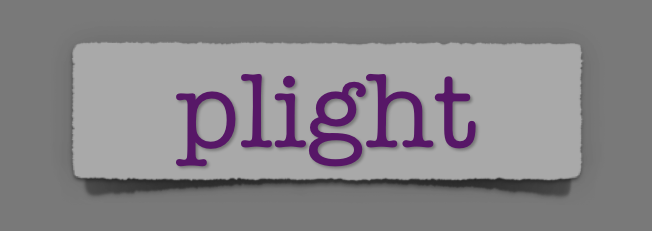Plight.
I woke up with the word on my mind this morning. It was one of the early submissions when I asked people to give me words for my Lenten journal and it has pulled at me all along the way. I know the word primarily as a noun, as in “we should do something to alleviate the plight of the poor in our state.” In its verb form it means to pledge solemnly or to be engaged to be married. Both carry a sense of a lifetime, though the verb also has a sense of choice, where the noun feels more permanent.
Plight: a dangerous, difficult, or otherwise unfortunate situation.
The word carries a note of sadness, even despair in common usage. We don’t, for example, talk about the plight of the rich. We use the word to speak of those who are not us; whom we don’t really know how to help, perhaps; who are outside of our circle of life. Perhaps we use it for the things in life over which we feel we have little control. Circumstances we have to learn to live with. I think of Jesus saying, “The poor you will have with you always.” I don’t think he was saying we just give up and let those in need stay that way. A plight may be difficult; it doesn’t have to be permanent.
I read more of bell hooks over lunch today. The chapter I was reading began with these words:
No doubt every writer of essays has one or two that give them pause, make them think again and again, wondering where did that come from. It is usually impossible to explain to folks who are not writers that ideas, words, the whole essay itself may come from a place of mystery, emerging from the deep deep unconscious surfacing, so that event he writer is awed by what appears. Writing then is revelation. It calls up and stirs up. It illuminates.
Maybe that’s what set me to chasing after plight today—hopes of illumination. My mind has run all over the place. I remember hearing part of a program on The State of Things last week where the person was talking about those whom we call the working poor, but he did more than merely articulate their plight. He said those of us who are people of privilege have to consider how our very lifestyles create oppression, how the standard of living to which we have become accustomed makes low wages and poor opportunities the norm for a large number of people.
bell hooks lives in Berea, Kentucky and teaches at the college of the same name. I learned both from her book and from a woman I met at work whose father graduated from Berea that it has a long history of seeking to change the plight of those who are poor in Appalachia. The school is tuition free and is only open to students whose families make less than $18,000 a year. Before the Civil War it was integrated and coeducational. After slavery ended, the state government forced them to segregate, but spirit of equality remained and prevailed.
hooks spoke of living there this way:
Living in community where many citizens work to end domination in all forms, including racial domination, a central aspect of our local culture is a willingness to be of service, especially to those who are for whatever reason among the disenfranchised. Dominator culture devalues the importance of service. Those of us who work to undo negative hierarchies of power understand the humanizing nature of service, understand that in the act of caregiving and catering we make ourselves vulnerable. And in that place of shared vulnerability there is the possibility of recognition, respect, and mutual partnership.
What drives me to cynicism about much of the national Congress and our state legislature is I don’t think the concept of service ever crosses their minds. They are looking to shore up the hierarchies, to ensconce themselves in the halls of power, and to get reelected. I see little evidence of caregiving, respect, or mutuality. They may be elected officials; they are by no means leaders.
The hope of a better world will not come out of the halls of government. It will come, instead as we make ourselves more vulnerable. If the world feels more dangerous, let us respond by opening the gates, not by building more walls. If we are less sure of how we are going to make it, then let us more first to share rather than hoard. “I was hungry and you fed me,” Jesus said. “Homeless and you took me in.” The plight of the poor is our plight, too. We are all in this together.
When I started thinking about the word plight this morning, I had no idea where it would take me. hooks is right: I’m stirred up. I’ll keep praying for the illumination.
Peace
Milton

Thanks for offering lots to chew on and pray about.